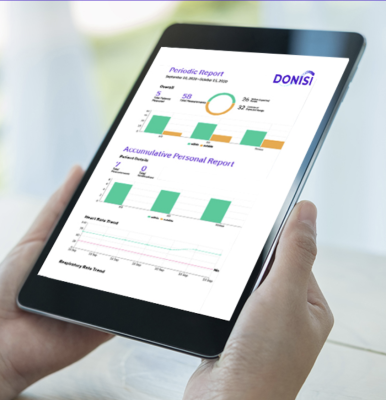
April 6, 2022 – Donisi Health, a MedTech company working to disrupt the readmission cycle of congestive heart failure (CHF) patients, announced results of a clinical study demonstrating the efficacy of its contact-free technology for the detection of pulmonary congestion at home. The research, the first of its kind to assess an infrared optical-based contact-free sensor for remote monitoring of CHF patients, was presented at the American College of Cardiology’s annual Scientific Session (ACC22).
Pulmonary congestion, the buildup of liquid in the tissue and air spaces in the lungs, is a key indicator of CHF exacerbation. Affecting nearly seven million people in the United States alone, CHF is the number one cause of hospital readmissions among Medicare patients, with more than 20% readmitted in the first 30 days post-discharge and 50% within 6 months. Today there are no easy-to-use at home tools that provide early detection of pulmonary congestion to help physicians prevent hospitalizations of CHF patients.
“Current hospital readmission rates for CHF patients are staggering and drive significant costs to the healthcare system, as well as to human health,” said Prof. Yaron Arbel, M.D., Interventional Cardiologist at Tel Aviv Sourasky Medical Center and the senior investigator leading the research. “This study demonstrates the potential of Donisi’s remote monitoring solution to benefit patients by detecting key health biomarkers such as pulmonary congestion at home, enabling timely intervention by healthcare teams to help prevent unnecessary patient re-hospitalization.”
The study assessed Donisi’s novel contact-free, tabletop device, the Gili Pro BioSensor (Gili), and its ability to accurately detect pulmonary congestion by detecting nano-vibrations from the patient’s chest, through their clothes, and analyzing it in the cloud using proprietary algorithms and AI. The Gili system achieved sensitivity and specificity of 0.91 (95% CI: 0.86-0.93) and 0.91 (95% CI: 0.87-0.94), respectively, with an accuracy of 91%.
Currently, discharged patients are told to weigh themselves daily, but once weight gain is detected – or symptoms worsen – it is usually too late to prevent hospital readmission.
The study confirms for the first time that a contact-free infrared optical solution can provide medical-grade monitoring for pulmonary congestion, offering a novel approach for at-home monitoring that may help to reduce the significant readmission rates associated with CHF.
Study participants were examined using the Gili, Donisi’s multiparameter health detection device. A total of 227 CHF patients participated in the study. Of the study participants, 101 suffered from pulmonary congestion, and the other 126 participants were patients without congestion who served as study controls. Pulmonary congestion was assessed clinically, verified via two cardiologists, and was confirmed in a subgroup of patients in whom the device findings were also compared to results from lung ultrasound.
“It is well established that when pulmonary congestion is detected early and care teams are able to intervene – while patients are still at home before their condition worsens – many of these readmissions can be avoided, resulting in significant cost reduction and improved patient outcomes,” said Dr. Shaddy Hassan, M.D., Chief Medical Officer for Donisi Health. “As far as we know, ours is the only solution proven to provide medical-grade detection of pulmonary congestion in CHF patients, at home, with without need for implants, wires, or wearables.”
Donisi’s patented AI-based technology detects and analyzes multiple health bio-indicators simultaneously, providing a platform solution for managing patients with multiple chronic conditions and co-morbidities. By delivering clinically meaningful insights and notifications of changes in key health indicators, Donisi can enable a pre-emptive approach to cardiac and pulmonary health monitoring, helping optimize care, reduce healthcare costs and provide a safety net for patients with CHF and other chronic conditions.
The clinical study was conducted in collaboration with the Department of Cardiology at the Tel Aviv Sourasky Medical Center. It was presented at ACC22 on Sunday, April 3, 2022, and has been submitted for publication.
Related Heart Failure Technologies to Reduce Hospitalizations:
VIDEO: Remote Heart Failure Monitoring Results in Reduced Readmissions — Interview with William Abraham, M.D.
New CardioMEMS Data Shows Effectiveness in Reducing Heart Failure Readmissions
VIDEO: Technologies to Reduce Heart Failure Readmissions — Interview with William Abraham, M.D.
Abbott Initiates GUIDE-HF Trial for Improved Outcomes With CardioMEMS Monitor
Device Technologies to Reduce Heart Failure Readmissions


 July 31, 2024
July 31, 2024 









